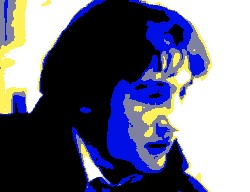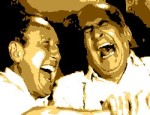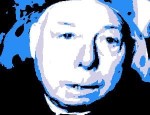Film Review

Despite its failings, the film is a curious and haunting work, occasionally allowing us to see the major achievement it could have been. It also presages some of André Téchiné subsequent better films with its twisted film noir characters and dark, dramatic intensity.
© James Travers 1999
The above content is owned by frenchfilms.org and must not be copied.
Film Synopsis
In a gloomy seaport, a bitterly fought election campaign is underway and a young boxer named Samson sees an easy way to earn himself a large amount of cash. He has knowledge about one of the candidates which, were it to become widely known, would almost certainly cost him the election. Samson sells what he knows to an unscrupulous newspaper publisher and makes immediate plans to start a new life in another country with his girlfriend Laure. Before they can make their getaway, a hit-man who bears an uncanny resemblance to Samson - in fact he might even be his twin brother - goes chasing after the boxer and kills him.Fleeing with her lover's ill-gotten gains, Laure takes refuge at the home of a friend of hers, a prostitute named Nelly. Determined to recover the money, the mysterious hired assassin continues hunting Laure but when he catches up with her he is unable to fulfil his contract. For her part, Laura is overtaken not by fear, but by an intense fascination for the stranger who looks so familiar to her. By dyeing the man's hair he becomes the exact likeness of Samson and Laure is able to carry on her love affair as if her dead boyfriend had suddenly been brought back to life. With other hit-men close on their heels, the two lovers resume their flight across town, determined to escape their present nightmare...
© James Travers
The above content is owned by frenchfilms.org and must not be copied.
Similar Films
Here are some other films you may enjoy watching:- Le Clan des Siciliens (1969)
- Le Pacha (1968)
- La Balance (1982)
- Mort d'un pourri (1977)
- Compartiment tueurs (1965)
Other related links:
Film Credits
- Director: André Téchiné
- Script: Marilyn Goldin, André Téchiné
- Cinematographer: Bruno Nuytten
- Music: Philippe Sarde
- Cast: Isabelle Adjani (Laure), Gérard Depardieu (Samson), Marie-France Pisier (Nelly), Jean-Claude Brialy (Walt), Julien Guiomar (Gauthier), Hélène Surgère (Antoinette), Jean-François Stévenin (Jeune homme brun), Peter Bonke (Acolyte 1), Leny Suck (Acolyte 2), Elise Hoomans (Mère de Samson), Frans Vorstman (Secrétaire), Helmert Woudenberg (L'emtraineur), Adrian Brine (L'inspecteur), Truus Dekker (L'employée), Susan Senduk (Serveuse B), Serge-Henri Valcke (Barman), Mac Maaldrink (Cascadeur), Derek de Lint (Propagandeman 1), Claude Brasseur (Jules), Marie-France (La chanteuse)
- Country: France
- Language: French
- Support: Color
- Runtime: 115 min
The very best of French film comedy

The greatest French film directors

The Golden Age of French cinema
